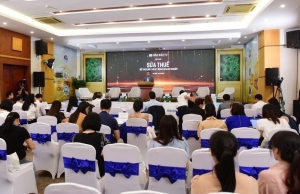Sudden increase in special consumption tax fails to change consumer behaviour
Phung said statistics from 2003 to 2016, based on data from the Beer and Alcohol Association and the General Department of Taxation, show that over 13 years, the average per capita beer/alcohol consumption rate rose from 3.8 litres per person annually to 6.6 litres during 2008-2010. By 2016, at the peak of economic growth, this consumption had reached 8.3 litres per person annually.
 |
| Nguyen Van Phung, former director of the Department of Tax Administration at Large Enterprises |
Meanwhile, alcohol tax rates increased from 45 per cent in 2010-2012 to 50 per cent in 2013, 55 per cent in 2016, 60 per cent in 2017, and 65 per cent from 2018 onwards. Despite continuous tax hikes over a decade, average per capita alcohol consumption doubled. Alarmingly, alcohol-related violent behaviour increased from 1.4 per cent of the population in 2010 to 14.4 per cent in 2016. While taxes increased by 5 per cent annually, alcohol-related violence surged tenfold.
"This demonstrates that increasing the special consumption tax (SCT) doesn't change consumer behaviour. Consumer behaviour actually changed due to Decree 100. Clearly, administrative measures are more effective than taxation," Phung stated, proposing to extend these administrative measures as they have a far stronger impact than tax instruments.
In a sideline discussion, Phung noted that businesses and citizens generate income, so taxation must align with people's income levels and consumption patterns.
From a comprehensive perspective, Phung shared that the draft amendments to the Law on SCT submitted by the Ministry of Finance (MoF) to the government on July 24 shows progress by incorporating public feedback and not applying mixed or flat-rate duties methods.
In Vietnam, immediately applying flat-rate duties or mixed methods would shock and harm businesses and consumers, as the majority have average incomes insufficient for high-end alcohol consumption.
"We can only consume moderately priced products, such as beers costing $0.6-0.8 per can. Therefore, applying tax as a percentage is reasonable," Phung said.
Regarding the two options being considered by the MoF, a substantial immediate increase or a gradual increase, Phung stated that he is not leaning towards either option. However, he emphasised that regardless of the chosen approach, it must ensure an increase in state budget revenue. This is because Vietnam needs to consider revising personal income tax and corporate income tax. If there are reductions in revenue from these areas, increases must be made elsewhere to maintain the state budget. Therefore, Phung stressed the need to encourage manufacturers to cooperate with the government and accept tax adjustments.
Phung emphasised that when increasing the SCT, authorities should conduct communication campaigns to help consumers accept new prices and businesses adapt to impacts on their operations.
 | VIR conference on Special Consumption Tax Law attracts thousands A conference themed “Tax Amendments to Promote Business Activities” held by VIR has attracted thousands of people both online and offline. |
 | VBA requests amendments to the draft on special consumption tax Although the Vietnam Beer-Alcohol-Beverage Association supports the government's policy on amending the special consumption tax, it has suggested a reduction in the amount of tax to be increased and a reasonable extension of the timeline to stabilise the market. |
 | A holistic approach to the increase of special consumption tax on beer and spirits A holistic approach should be taken to setting a new limit and timeline for a special consumption tax on beer and alcohol. |
What the stars mean:
★ Poor ★ ★ Promising ★★★ Good ★★★★ Very good ★★★★★ Exceptional
Related Contents
Latest News
More News
- VinaCapital launches Vietnam's first two strategic-beta ETFs (February 26, 2026 | 09:00)
- PM sets five key tasks to accelerate sci-tech development (February 26, 2026 | 08:00)
- PM outlines new tasks for healthcare sector (February 25, 2026 | 16:00)
- Citi report finds global trade transformed by tariffs and AI (February 25, 2026 | 10:49)
- Vietnam sets ambitious dairy growth targets (February 24, 2026 | 18:00)
- Vietnam, New Zealand seek level-up in ties (February 19, 2026 | 18:06)
- Untapped potential in relations with Indonesia (February 19, 2026 | 17:56)
- German strengths match Vietnamese aspirations (February 19, 2026 | 17:40)
- Vietnam’s pivotal year for advancing sustainability (February 19, 2026 | 08:44)
- Strengthening the core role of industry and trade (February 19, 2026 | 08:35)

 Tag:
Tag:


















 Mobile Version
Mobile Version